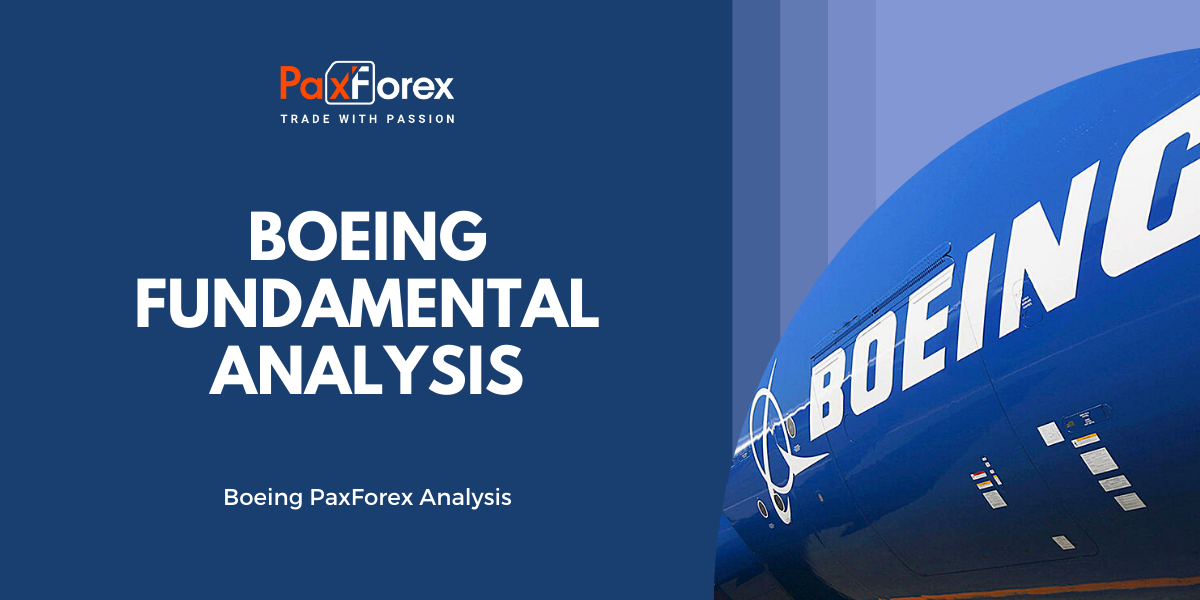
Source: PaxForex Premium Analytics Portal, Fundamental Insight
Boeing shareholders have faced a disappointing year, as the company's operational performance has fallen short of expectations. Nevertheless, there remains a compelling investment case for value investors. The question is whether this case justifies buying Boeing stock. Here's the rundown.
At the outset of the year, Boeing investors were eagerly anticipating progress toward the medium-term goals outlined during the November 2022 investor conference. The primary target was achieving $10 billion in free cash flow (FCF) within the 2025 to 2026 timeframe. This level of FCF would not only aid in reducing Boeing's significant debt (currently at $52.3 billion) but also make it relatively attractive for value investors, who could project a price-to-FCF multiple of 11 times FCF by 2026, indicating strong value. Boeing maintains a robust business position with a multiyear backlog of orders.
However, while it's one thing to pencil in $10 billion, it's quite another to have confidence in Boeing's ability to reach this figure. The company needed to accomplish two crucial objectives in 2023:
- Hitting its target of 400 to 450 deliveries of its 737 MAX airplanes, it embarked on the journey to increase production from 31 a month at the start of the year to 38 a month, eventually reaching 50 a month in 2025/2026.
- Avoiding further multibillion-dollar charges related to problematic fixed-price defense contracts, thereby working through these challenges and restoring profitability to Boeing's defense, space, and security (BDS) segment over time.
Unfortunately, Boeing will not achieve either of these goals in 2023.
First, Boeing encountered challenges in meeting its 737 MAX delivery target for 2023 due to a manufacturing issue with fuselages supplied by Spirit AeroSystems. Consequently, management adjusted its target from 400 to 450 deliveries to a new range of 375 to 400, reflecting the necessary corrections.
Second, issues persist in the defense segment. For example, Boeing reported a $482 million charge on the VC-25B (Air Force One) fixed-price development program in the third quarter, a $315 million loss related to a satellite contract, and "material cost pressures across a couple of programs totaling $136 million, primarily driven by the MQ-25 program (Stingray aerial refueling drone)," according to Boeing's CFO, Brian West, during the earnings call.
West acknowledged, "This performance is below our expectations, and we acknowledge that we aren't as far along in this recovery as we expected to be at this stage."
Despite the setbacks, Boeing's stock has only declined by 4.1% this year as of the current writing. This resilience is likely due to the stock's initial attractive valuation, capable of withstanding some disappointment, a classic value investment situation.
It still holds value for three interconnected reasons. First, management maintains its FCF target of $3 billion to $5 billion for 2023. While this range is quite broad, it is reasonable to assume that Boeing set it while believing it could still achieve the $10 billion FCF target in 2025/2026, even if it lands at the lower end of the $3 billion to $5 billion range in 2023.
Second, CEO Dave Calhoun pointed out that the issue with 737 MAX deliveries is not a supply chain constraint but rather a manufacturing quality issue. This suggests that once resolved, Boeing can align production with its targets. Furthermore, Boeing and Spirit have reached an agreement that benefits the latter financially and reduces the risk of fuselage supply delays.
Third, the defense challenges are indeed problematic, but key milestones are expected to be reached in 2024 for programs like MQ-25, VC-25B, and the KC-46 tanker (another high-cost program).
Value investors will find Boeing's stock still offers a compelling value proposition, with the potential for significant upside following a few successful quarters of execution.
However, potential investors may prefer to exercise caution and await the company's guidance for 2024. While management has indicated that FCF is likely to be higher in 2024, it also mentioned that FCF would likely fall toward the lower end of the 2023 range. Moreover, the stock's limited 4.1% decline this year, despite increased risks surrounding its medium-term guidance, suggests that the risk-reward profile is less favorable than before. Therefore, exercising some patience before making an investment decision is likely the prudent approach.
As long as the price is above 184.00, follow the recommendations below:
- Time frame: D1
- Recommendation: long position
- Entry point: 192.65
- Take Profit 1: 199.00
- Take Profit 2: 207.00
Alternative scenario:
If the level of 184.00 is broken-down , follow the recommendations below:
- Time frame: D1
- Recommendation: short position
- Entry point: 184.00
- Take Profit 1: 176.40
- Take Profit 2: 170.00













